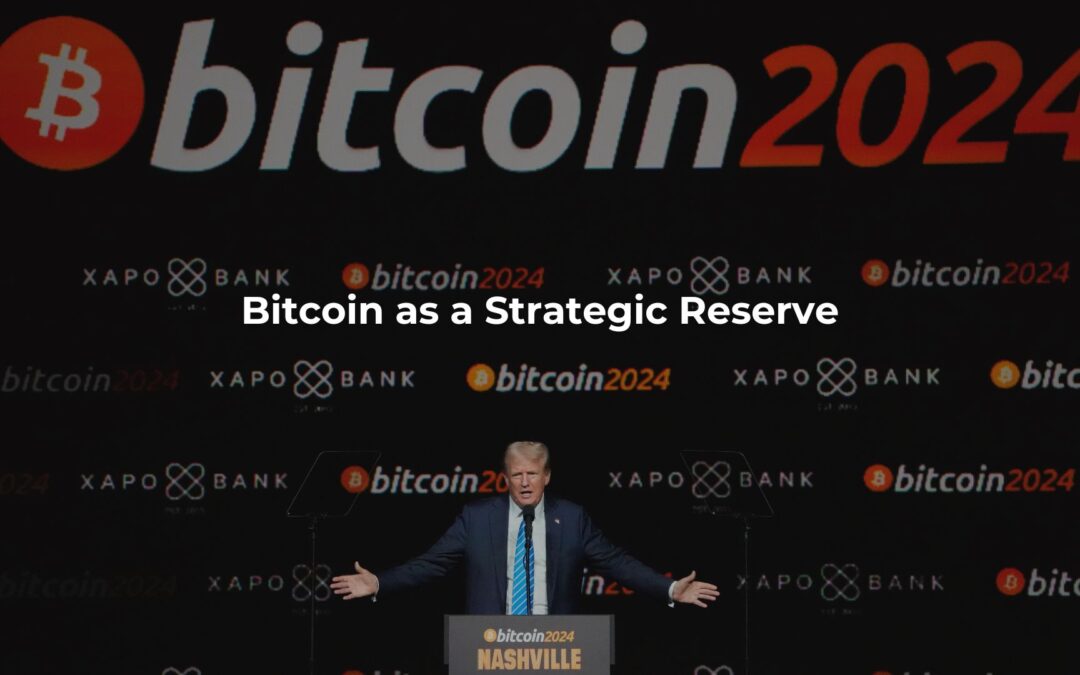
Bitcoin’s Price and Adoption if Donald Trump Fulfills His Promise of Bitcoin as a Strategic Reserve
In an unprecedented shift in monetary policy, the notion of Bitcoin being utilized by a government as a strategic reserve asset has captured the imagination of both financial leaders and Bitcoin advocates. On July 27th, now President-Elect Donald Trump, spoke about his plan to adopt Bitcoin as part of the United States’ strategic reserves. The implications for Bitcoin’s price and global adoption could be transformative.
Understanding Strategic Reserves and Bitcoin
Strategic reserves are typically composed of valuable assets that a government holds to safeguard its economic stability and national security. Traditionally, these have included gold and foreign currencies. Introducing Bitcoin into this mix marks a radical departure from conventional fiscal policy, driven by Bitcoin’s properties as a decentralized, finite digital asset with potential to hedge against inflation and currency devaluation.
1. Potential Impact on Bitcoin’s Price Increased Demand and Scarcity –
By incorporating Bitcoin into national reserves, demand for the asset would likely surge. Given Bitcoin’s capped supply of 21 million, increased purchases at such a scale could drive significant upward pressure on its price. Analysts have predicted prices anywhere between $150,000 to $500,000 USD by the end of 2025.
2. Market Validation and Confidence –
The endorsement of Bitcoin by the world’s largest economy would validate it as a legitimate store of value and financial instrument. This recognition would likely boost investor confidence across global markets, attracting a wave of institutional and retail investments eager to capitalize on the anticipated price surge.
3. Speculative Frenzy –
Anticipation of government purchases can create speculative trading activity, further fueling Bitcoin’s price escalation. Traders might attempt to front-run such movements, leading to heightened volatility in the short term.
Adoption and Integration into National Economies

1. Catalyzing International Adoption –
Should the United States adopt Bitcoin as part of its strategic reserves, other countries may follow suit to diversify their own reserves and remain competitive. This domino effect, known by Bitcoin advocates as “Game Theory”, could hasten global adoption, pushing Bitcoin toward mainstream acceptance and integration into traditional financial systems. BRICS has already openly discussed this.
2. Innovations in Regulation and Infrastructure –
Increased adoption at a national level would necessitate the development of robust regulatory frameworks to manage, secure, and transact in Bitcoin. Improved infrastructure, including clear regulations and advanced technological solutions, might emerge to support this shift.
3. Mainstream Financial Products and Services –
Financial institutions, witnessing the monumental shift in Bitcoin’s status, could accelerate the proliferation of Bitcoin-focused financial products and services. This includes Bitcoin mutual funds, ETFs (which already exist), and insurance products, widening the avenues for everyday investors to participate in the Bitcoin market.
Geopolitical and Economic Considerations
1. Impact on U.S. Dollar Dominance –
Integrating Bitcoin into the reserve system could potentially challenge the dominance of the U.S. dollar in international trade, prompting discussions about future global currency standards and the role of decentralized digital currencies.
2. Adaptive Monetary Policies –
Central banks may need to adapt their monetary policies to account for Bitcoin’s volatility. This could include developing new strategies to manage economic cycles, inflation, and interest rates in conjunction with Bitcoin.
Final Thoughts
The adoption of Bitcoin as a strategic reserve asset under a Donald Trump presidency would be a monumental step in the evolution of global monetary systems. Such a move could dramatically increase Bitcoin’s price, expand its adoption, and drive sweeping changes in financial infrastructure and regulation. While this scenario remains yet to be seen, the potential implications underscore the growing significance of Bitcoin in shaping the future of finance, presenting both opportunities and challenges for governments, institutions, and investors worldwide.
